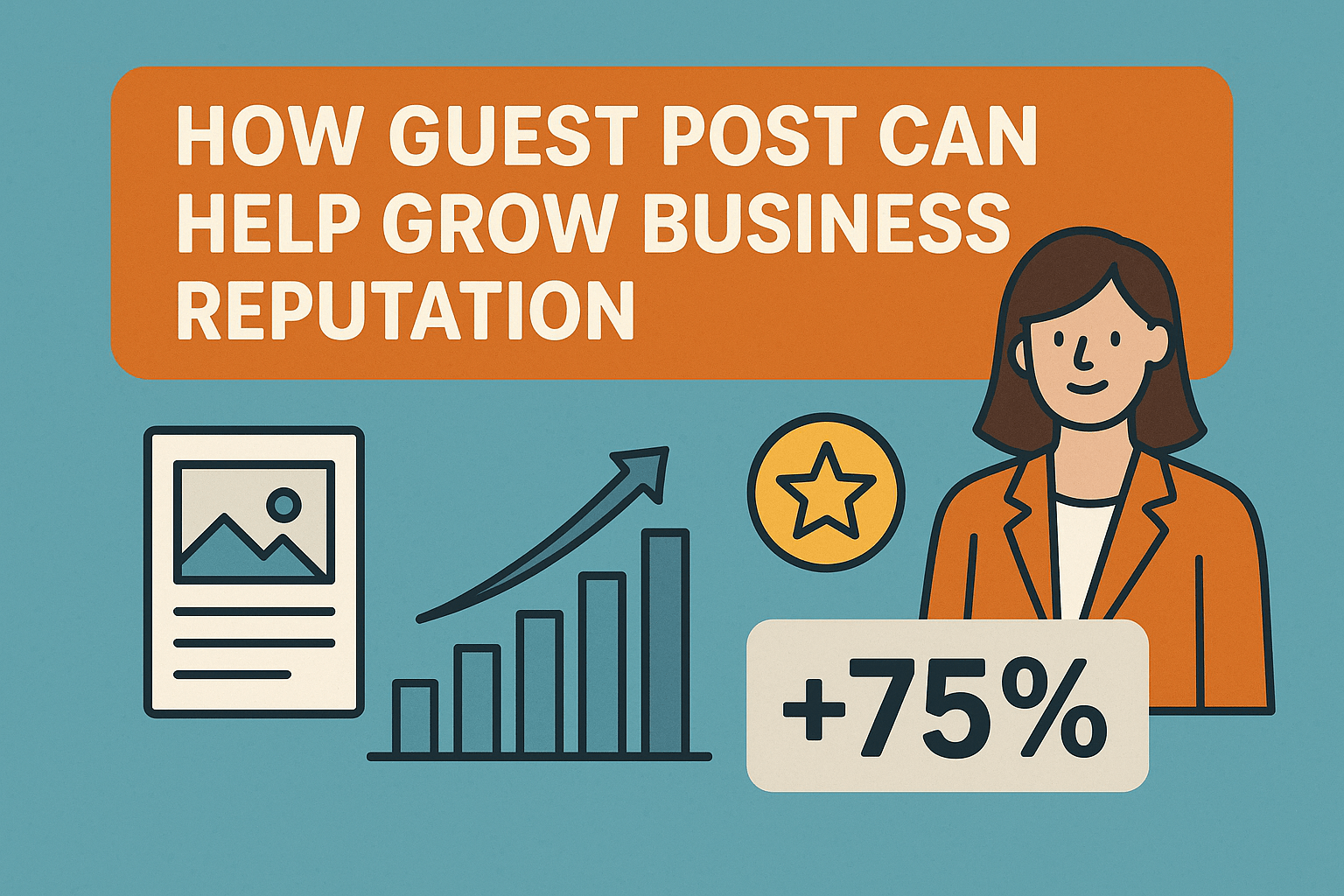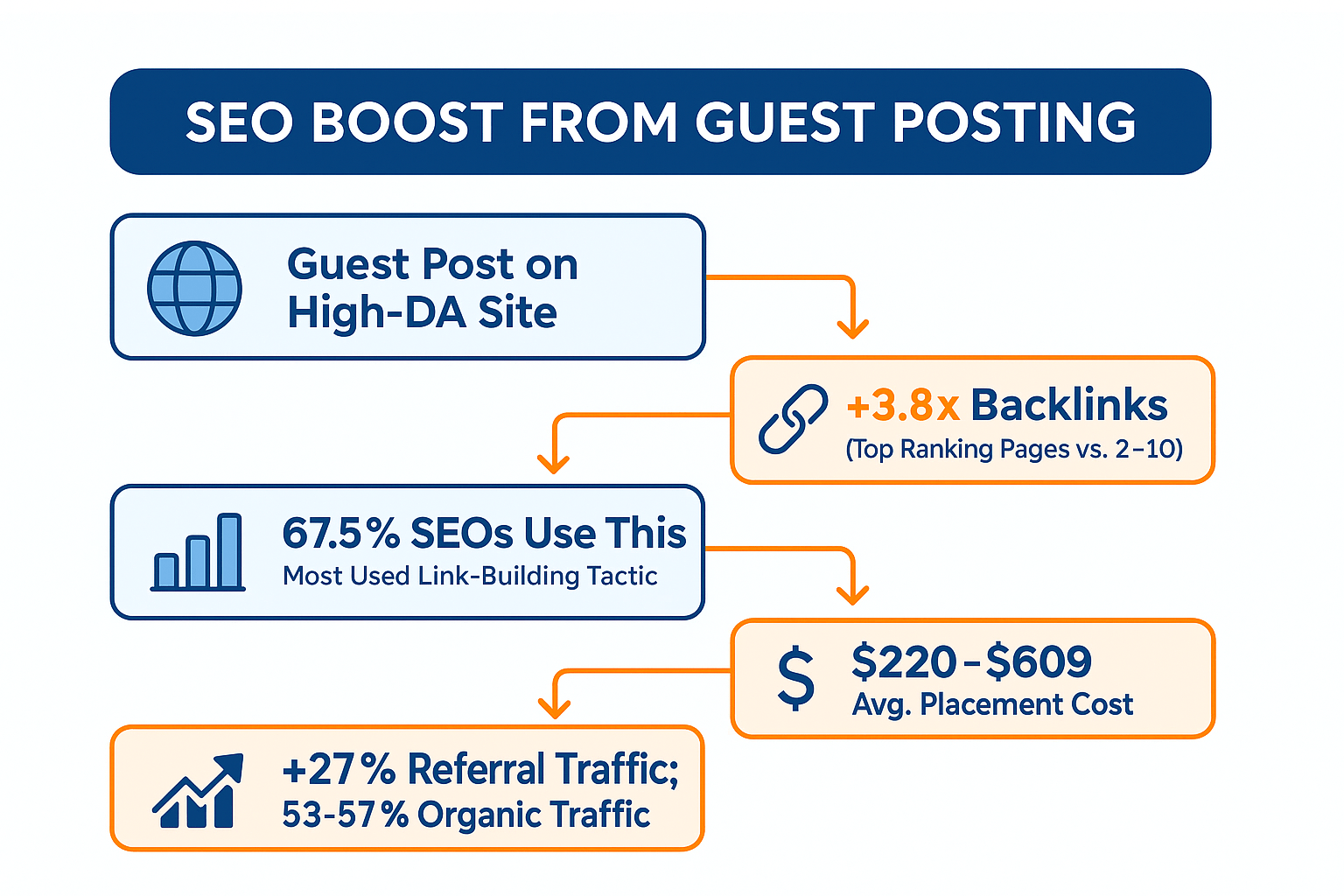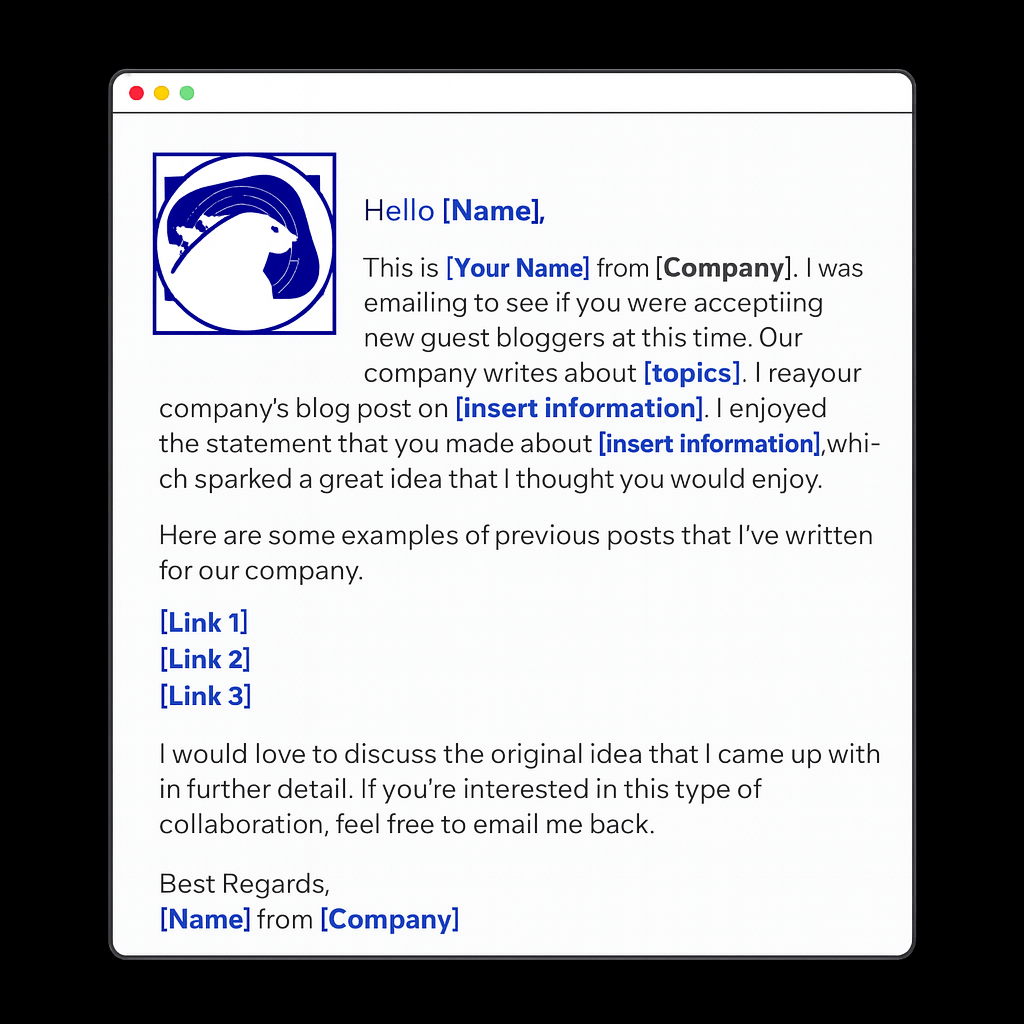
What is Guest Posting and Why Does It Matter?
What is Guest Posting and Why Does It Matter?
Guest posting is a concept that has grown well beyond its original digital marketing roots. What started as a way for bloggers to write on each other’s platforms now sits at the junction of content strategy, search engine presence, personal branding, and business relationship building.
Picture this: you’re reading your favourite industry blog, and you come across an article by someone whose name you haven’t seen before. You’re hooked, and you click through to their byline. Suddenly, you’re introduced to a fresh perspective, new insights, and perhaps a solution to a challenge you didn’t realise you had. You’ve just interacted with a guest post, and this simple encounter reveals the core of what makes guest posting so effective.
Making Connections Beyond Borders
At its heart, guest posting is about collaboration and sharing expertise. It involves publishing your articles or stories on someone else’s website or blog. The site hosting your work gains quality content that speaks to their audience’s interests, and as the writer, you’re introduced to new readers and networks. Writers often bring their own followers along too, which helps both parties grow their digital footprint.
This practice can happen across many types of platforms: industry news sites, company blogs, niche publications, or even mainstream media. The key is that both parties see real value in the exchange, and the guest post offers something relevant and meaningful to the host’s audience.
The Power of Authority and Trust
Why has guest posting become so influential? The answer lies in authority. When your work appears on a reputable website, you’re automatically associated with its reliability and knowledge. People are more likely to trust your voice when it’s introduced by a platform they already respect.
Search engines see this, too. Links from respected sites to your own website or portfolio signal that your expertise is both valid and valuable, giving your online presence a healthy boost. But authority isn’t just about algorithms—it’s about human connection.
A well-placed article can elevate your brand and help build trust with readers who might have never sought you out otherwise.

Guest Posting and SEO: Maximising Search Impact
One of the most compelling reasons professionals embrace guest posting is its potential to boost search engine rankings. When executed thoughtfully, guest posts can be a powerful part of your SEO strategy—but only if you follow best practices and stay within search engine guidelines.
How Guest Posting Improves SEO
- Backlinks from Authoritative Sites: When your guest post is published on a reputable website, you often receive a link back to your own site. These backlinks signal to search engines that your content is trustworthy and relevant, which can improve your site’s authority and rankings.
- Brand Mentions and Referral Traffic: Even when links are “nofollow,” brand mentions and referral traffic from high-quality guest posts can indirectly support your SEO by increasing your site’s visibility and engagement.
- Diverse Link Profile: Guest posting helps diversify your backlink profile, making it appear more natural to search engines and reducing the risk of penalties associated with manipulative link-building tactics.
Google’s Guidelines: What to Avoid
Google values authenticity and user-focused content. To stay on the right side of search engine guidelines:
- Avoid large-scale guest posting campaigns solely for link-building.
- Don’t use keyword-stuffed or irrelevant anchor text.
- Never pay for links or participate in link schemes.
- Ensure your content is original, high-quality, and genuinely valuable to the host’s audience.
Google’s John Mueller has stated that guest posts should be written for exposure and reputation, not just for SEO. Overly promotional or low-quality posts can result in penalties that harm your site’s rankings.
Practical SEO Tips for Guest Posting
- Choose Reputable Sites: Target blogs and websites with strong domain authority, relevant audiences, and clear editorial standards.
- Optimise Anchor Text: Use natural, relevant anchor text for any links back to your site. Avoid exact-match keywords; instead, opt for branded or contextual phrases that fit seamlessly within the content.
- Limit Self-Promotion: Focus on providing value rather than promoting your own products or services. Most hosts allow a brief author bio where you can include a link to your site.
- Track SEO Impact: Use tools like Google Analytics and Search Console to monitor referral traffic, new backlinks, and changes in your search rankings after your guest posts go live.
By following these best practices, guest posting can become a sustainable, long-term driver of both authority and organic growth, helping you build a reputation that stands out in search results and in your industry.

Beyond SEO: A Broader Perspective
There’s sometimes a perception that guest posting is solely about getting backlinks for search engine rankings. While links are important, this view misses the bigger picture. Guest posts do far more than add notches to a website’s SEO metrics. When approached genuinely, guest posting can:
- Spark meaningful conversations around new ideas or trends
- Create professional relationships and future partnerships
- Show your thought leadership within your field
- Generate direct traffic to your own platforms
- Encourage collaborative opportunities, like joint ventures or speaking gigs
Guest posting can be the engine for long-term growth, not just a quick fix for web traffic.
Quality over Quantity: Setting Standards
With benefits on the table, it’s no wonder guest posting attracts so much attention. However, not all posts are created equal. High-quality guest posting is a blend of good research, genuine insight, and strong writing. Spammy, self-promotional content rarely makes an impact and can even harm reputations.
Some hallmarks of valuable guest content include:
- Unique insights based on real experience or research
- Practical advice tailored to the host’s audience
- Original voice and style, rather than boilerplate copy
- Sources and references that add credibility
- Respect for the host site’s guidelines and ethos
Hosts and writers should both insist on these standards. It ensures every guest post is a win for everyone involved, including the audience.
Outreach: Connecting with the Right Platforms
Effective outreach is the engine that drives successful guest posting. It’s not just about sending mass emails—it’s about identifying the right platforms, crafting personalised messages, and building genuine relationships with editors and site owners. Thoughtful outreach increases your chances of being accepted and sets the stage for long-term collaboration.
Steps for Successful Guest Posting Outreach
- Identify Target Blogs and Websites
- Research sites relevant to your niche, industry, or expertise.
- Look for platforms with engaged audiences and clear contributor guidelines.
- Prioritise sites with strong domain authority and a reputation for quality content.
- Understand Their Content and Audience
- Read several recent articles to get a feel for tone, style, and topics.
- Note what types of guest posts have performed well in the past.
- Identify gaps where your expertise could add value.
- Find the Right Contact
- Locate the editor’s or content manager’s email address, often found on “Contact” or “Write for Us” pages.
- If not listed, use LinkedIn or professional networks to connect.
- Craft a Personalised Pitch
- Address the recipient by name and reference specific articles or topics from their site.
- Clearly state your proposed topic and why it’s a good fit for their audience.
- Highlight your relevant experience or previous guest posts.
- Follow Up Respectfully
- If you don’t hear back within a week or two, send a polite follow-up email.
- Express continued interest and offer to adjust your pitch if needed.
- Build Relationships
- Engage with the site’s content on social media.
- Respond to comments on your published guest posts.
- Stay in touch for future collaboration opportunities.
Outreach Checklist
- Researched and shortlisted relevant blogs/websites
- Reviewed recent content and audience interests
- Found the correct contact person
- Crafted a tailored, value-driven pitch
- Sent a polite follow-up if needed
- Engaged with the platform’s community
By approaching outreach as a relationship-building exercise rather than a numbers game, you’ll stand out from the crowd and open doors to meaningful guest posting opportunities.
Email outreach example:
Building Relationships Through Content
Beyond the immediate gains, guest posting is a catalyst for professional relationships. Writers and hosts often stay in touch, continuing to share each other’s work, collaborating on future content, and even referring clients.
For brands, partnering with an SEO company on content communicates that they’re open to new ideas and connections, signalling openness and credibility to their community. For writers and professionals, it becomes easier to reach out to influencers and establish a network of allies, so essential in crowded digital spaces.
Guest Posting Strategies: What Works?
Successful guest posting follows a few best practices. Some strategies include:
- Focusing on sites where your expertise fills a noticeable gap
- Tailoring pitches to show a deep understanding of the host’s editorial style
- Prioritising publications with active, engaged audiences (not just high web traffic)
- Creating evergreen content that stays relevant months or years after publication
- Following up after publishing to respond to reader comments and feedback
Writers who treat guest posting as an extension of their own brand—rather than a one-off effort—see better results. Consistency and sincerity go far.
Guest Posting Versus Sponsored Content
A question that often arises is what separates guest posting from sponsored content. They might sound similar, but there’s a crucial distinction.
Guest posts are typically written to share knowledge, provide valuable opinion, or introduce new ideas. Although they sometimes include a byline link, the tone remains informative rather than overtly promotional. They’re usually not paid for by the guest, though some sites may offer a small honorarium.
Sponsored content is advertising in article form. The brand pays the host to feature a piece that’s explicitly about their product or service. These articles are usually labelled as ‘sponsored’ or ‘advertorial’ to make the commercial nature clear.
Here’s a quick comparison:
| Characteristic | Guest Posting | Sponsored Content |
|---|---|---|
| Purpose | Inform/educate/engage | Promote a product/service |
| Payment | Rarely, if ever | Regularly paid |
| Editorial Control | Host/editor | Brand/client |
| Tone | Neutral or expert | Promotional |
| Disclosure Needed | No, unless linking to own product | Yes, always |
Keeping this distinction clear protects both credibility and transparency.
The Changing Landscape
Online content habits shift all the time, but guest posting’s staying power is clear. Today, publishers are often more selective, focusing on substance over volume. Google and other search engines have become much better at separating genuine contributions from spam.
As a result, the most effective guest posting is backed by real expertise and driven by a desire to make a difference to a community of readers. If you’re considering getting involved, focus on building a reputation as a trusted voice, not just gathering backlinks.
Embracing New Formats
Guest posting doesn’t look the same as it did five years ago. While written articles remain popular, multi-format collaboration is on the rise. Podcasts, expert roundtables, infographics, and even video guest contributions are being embraced by publishers looking to wow their audiences.
For those ready to push the boundaries, experimenting with these new formats can make your contributions stand out.
Some Tips for Getting Started
If you’re inspired to add guest posting to your own content strategy, here’s a quick checklist to keep in mind:
- Choose platforms that align with your expertise
- Read the host’s submission guidelines thoroughly
- Personalise your pitch to stand out
- Offer new insights, relevant data, or hands-on experience
- Engage with the audience after your post goes live
- Track which posts lead to new connections or valuable traffic
Building a successful guest posting record isn’t about churning out dozens of posts. It’s about crafting meaningful contributions that benefit everyone involved—most of all, the readers. And as more and more voices enter the digital space, genuine connections through shared expertise will always have lasting value.

